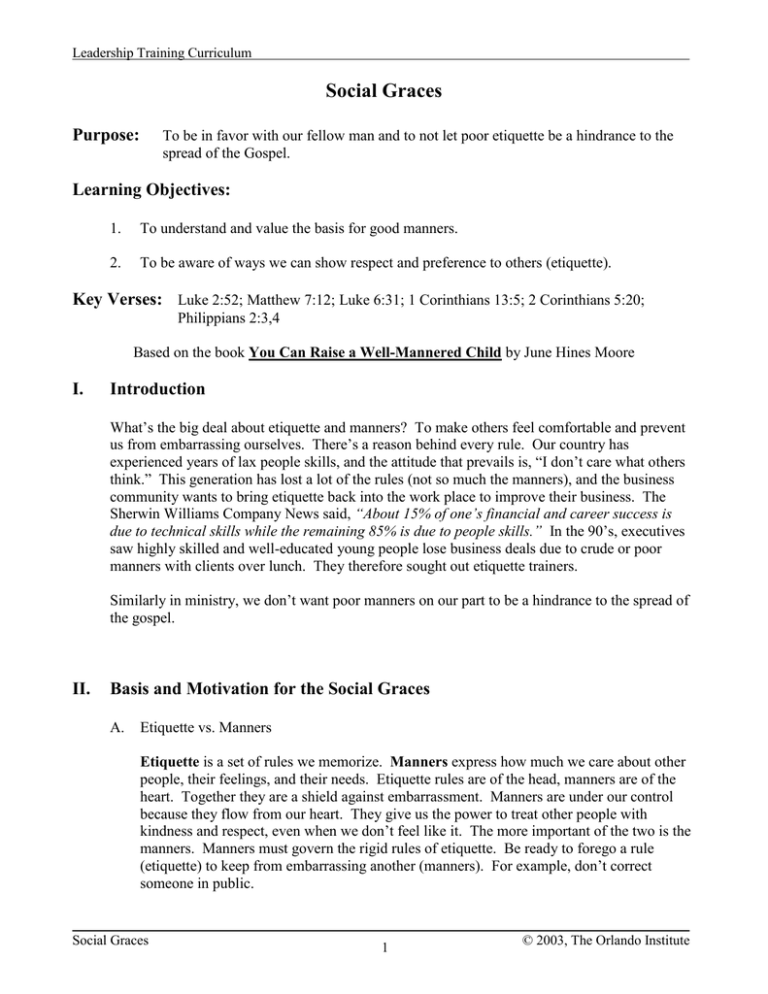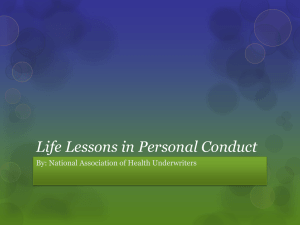Social Graces Purpose:
advertisement

Leadership Training Curriculum Social Graces Purpose: To be in favor with our fellow man and to not let poor etiquette be a hindrance to the spread of the Gospel. Learning Objectives: 1. To understand and value the basis for good manners. 2. To be aware of ways we can show respect and preference to others (etiquette). Key Verses: Luke 2:52; Matthew 7:12; Luke 6:31; 1 Corinthians 13:5; 2 Corinthians 5:20; Philippians 2:3,4 Based on the book You Can Raise a Well-Mannered Child by June Hines Moore I. Introduction What’s the big deal about etiquette and manners? To make others feel comfortable and prevent us from embarrassing ourselves. There’s a reason behind every rule. Our country has experienced years of lax people skills, and the attitude that prevails is, “I don’t care what others think.” This generation has lost a lot of the rules (not so much the manners), and the business community wants to bring etiquette back into the work place to improve their business. The Sherwin Williams Company News said, “About 15% of one’s financial and career success is due to technical skills while the remaining 85% is due to people skills.” In the 90’s, executives saw highly skilled and well-educated young people lose business deals due to crude or poor manners with clients over lunch. They therefore sought out etiquette trainers. Similarly in ministry, we don’t want poor manners on our part to be a hindrance to the spread of the gospel. II. Basis and Motivation for the Social Graces A. Etiquette vs. Manners Etiquette is a set of rules we memorize. Manners express how much we care about other people, their feelings, and their needs. Etiquette rules are of the head, manners are of the heart. Together they are a shield against embarrassment. Manners are under our control because they flow from our heart. They give us the power to treat other people with kindness and respect, even when we don’t feel like it. The more important of the two is the manners. Manners must govern the rigid rules of etiquette. Be ready to forego a rule (etiquette) to keep from embarrassing another (manners). For example, don’t correct someone in public. Social Graces 1 © 2003, The Orlando Institute Leadership Training Curriculum B. Basis for Good Manners. The basis for good manners is consideration for others. Manners are God’s idea. Look up the key verses listed at the beginning of the notes and write down how each relates to manners and why one should be concerned about the “Social Graces.” III. How Etiquette is Learned A. Common Sense. A wall plaque titled “Dutch House Rules” appeals to common sense: 1. 2. 3. 4. 5. 6. 7. B. If you open it, close it. If you turn it on, turn it off. If you move it, put it back. If you borrow it, return it. If you break it, repair it. If you make a mess, clean it up. If it is none of your concern, keep it that way.” Parents Modeling to Children. A queen of England said to her granddaughter, “You may have been born a princess, but you will have to learn to be a lady.” Home is where it all begins. Parents have the opportunity to build character in their children. It takes character to be polite when we would like to return rude for rude. Long ago, etiquette revealed one’s good breeding. Today, good manners portray a warm heart, good intentions, and self-respect regardless of one’s economic status. C. Books. One example is You Can Raise a Well-Mannered Child by June Hines Moore. An excellent book for teenagers is The Teenage Book of Manners…Please! by Fred Hartley and Family. Another could be Emily Post’s Etiquette 15th Edition by Elizabeth Post. D. Watching Others: Be observant. Watch someone older, especially the hostess. E. Trial and Error. We all make mistakes. Learn from them. When you don’t know what to do in a given situation, do that which you think would be the least disruptive. Social Graces 2 © 2003, The Orlando Institute Leadership Training Curriculum IV. Social Graces to Consider A. What We Say. 1. Meeting and Introducing. Five “S’s” of meeting others: Stand, Smile, See (their eyes), Shake, Say (“Hello John Doe, I’m happy to meet you.”). If you are in a group and you’ve not yet been introduced, you could approach someone and say something like, “My name is John Doe. I don’t think I’ve met you.” When introducing others, always make the attempt to introduce even if you forgot the etiquette rules. The etiquette rule in introductions is to introduce the lesser to the greater - looking at the face of the greater (“John, this is my boss Dr. Smith, Dr. Smith, this is John Doe, a friend of mine.” Women are honored over men except if the man is of royalty, clergy, elderly, or head of state. Non-family are honored over family.). Always repeat the name of the person introduced to you. In some areas of the United States (particularly the southeast), it’s expected to say “Sir” and Ma’am” to anyone who is older than you. In other parts of the United States, these same phrases could be considered disrespectful! One must be ready to be all things to all men (1 Corinthians 9:22). 2. On the Telephone. Always identify yourself immediately when making a telephone call (unless you know the person very well). Try to answer with a smile. If it’s for someone else, ask “May I ask who’s calling?” Don’t yell for the person to come get his phone call. Don’t make calls during mealtime nor after 9 pm unless pre-arranged (this could be adjusted to 9:30 or 10 pm if calling college students). You may want to consider letting the answering service take your calls over mealtime or when you want to spend uninterrupted time with your family. If you have call-waiting and a second call comes in, either ignore it, or ask the first caller if it’s OK to find out who is on the second line - if it’s OK to check on the second caller, tell the second caller you are on another line and ask when you could call them back. 3. Written Correspondence If the letter contains more than a single page, begin the second page on another sheet of paper and number the second and all additional pages. Short correspondences (Thank-you notes) to a personal friend or family member for non-business purposes should be handwritten. All other letters should be typed or computer-generated. The first sheet of a handwritten letter should only be written on one side – the rest of the pages written on front and back. If you are using printed stationery with personalized letterhead, the first sheet should always have the letterhead, all other sheets within the letter should be without letterhead. Social Graces 3 © 2003, The Orlando Institute Leadership Training Curriculum B. What We Do 1. Public Places When attending a special arts performance, females follow the usher to their seats, and the males follow the females. If there is no usher, the head of the family leads the way down the aisle and the females enter the seats first. If you need to get past people in your row to get to your seat, say “Excuse me” to about every third person, and face the audience (not the stage) as you are going through the row to your seat. If someone is disturbing during the performance, you could mention to the person “I am sorry, but I can’t hear the performance.” If this doesn’t work, ask the usher to call the manager, and if this doesn’t work, move to another available seat. In church, address the pastor as “Rev. Smith” or “Pastor Smith,” not as “Bob” (unless he asks you to call him by his first name). 2. Table Manners The goal here is to instill confidence - confidence in our social skills enables us to focus on others and overlook their faux pas. When coming to the table, stand (children wait for adults, men wait for women). Help the ladies with their chair. If you have to go to the bathroom, simply say, “Excuse me” without going into any details. Pass the salt and pepper together. The “signal” to begin eating is when the hostess puts her napkin in her lap. The “signal” that people may be excused is when the hostess takes her napkin out of her lap and puts it on the table. Men should help the ladies with their chairs. Be tactful about the discussion of religion or politics at the table. Every rule of etiquette has a practical reason. The overriding reason behind all of the rules of etiquette is simply to know what is proper and what is not so we can enjoy the food and the people in a quiet, congenial atmosphere. If we follow the rules, mishaps and offensive behavior won’t spoil everyone’s meal and embarrass us. Then we can focus on the food and fellowship, thus providing more opportunities to be “in favor with God and men.” See Appendix A and B for tips in passing the Social Graces on to our children. Discussion Questions: 1. What is the basis for good manners? 2. From your reading of the notes, in which areas do you see room for improvement in your life or in passing on the social graces to your children? Social Graces 4 © 2003, The Orlando Institute Leadership Training Curriculum Appendix A Tips for Parents “A man finds out what is meant by ‘a spitting image’ when he tries to feed cereal to his infant.” Because of each child’s individual unique personality, “one rule fits all” will not work. But here are some guidelines to help parents to pass on the social graces to their children. Children who see themselves as loved by their parents and by God are the ones most likely to use the good manners of kindness and consideration for others. Parents teach manners when they model positively, provide learning opportunities, make positive comments, and teach little by little. Parents can help create an environment for learning manners and be sure they are teaching age-appropriate rules. Don’t expect or demand too much of your child too early. Parents should not be the “manners police,” but the goal should be to inspire feelings and actions that show sensitivity to others. A helpful question to ask children who may have been insensitive to others is, “How would you feel if someone did to you?” Instead of manipulating and dictating our children, we can motivate and cheer them on as we give them gentle reminders, praise and time. We want well-mannered children who confidently meet and greet people, introduce themselves and others, use the telephone properly, become gracious hosts and guests, write thank-you notes, and dine gracefully. When children learn there is a reason for every rule of etiquette and that their lives can be more fun and comfortable, they are more willing to practice good social skills. Some teaching tools to help pass on the social graces are to use role-play (introducing, talking on the phone, etc.) and critiquing TV shows. Be careful not to model bad manners. For example, don’t lie by saying: “If the phone call is for me, I’m not home” or don’t show disrespect for others: “Look at that stupid idiot driver!” or yelling to your kids in the next room that the phone call is for them instead of going to them and talking in a quieter tone; or not doing what you said you would do; etc.) A. Specific Tips for Specific Areas 1. What to Say a. Introductions Teach them what to say (“Jenny, this is my mom, Mrs. Doe. Mom, this is my friend, Jenny Smith.”) If the child forgets to introduce you, don’t scold or correct in public. “Cover” for them and discuss the issue later. b. Talking To Others Teach them to speak the truth tactfully (They shouldn’t say, “That woman has blue hair!”). If they need to interrupt a parent who is already talking to someone else, they can take hold of the parent’s hand and look up to the parent to signal the need to say Social Graces 5 © 2003, The Orlando Institute Leadership Training Curriculum something (the parent should soon acknowledge this). Disagreeing with others is OK as long as it is done respectfully. 2. On the Telephone. Teach them how to answer, take messages, and notifying the person in the house whom the call is for (without yelling). Also consider teaching them how to dial in an emergency and if there is a fire to not use the house phone but to leave the house and use a neighbor’s phone. If Dad is away on a business trip and an unknown person calls for Dad, it’s OK to say something like, “He’s unavailable right now.” This is a true statement and the unknown caller doesn’t need to know that the man of the house is away for some time. Telephone etiquette can easily be taught by role-playing. 3. Guests and Hosts The guest is first in activities and in the choice of games. The guest should write a thankyou note to the host for inviting him/her to the sleep-over/birthday party, etc. The birthday person should send thank-you notes for gifts received. 4. Table Manners Parents need to instruct and model to the children that with guests, we go to a little extra trouble, not to put on airs or show off, but to show that we care enough to expend the extra effort. If the child wants to leave the meal early, he must ask permission. You could have practice sessions in which you ask the child questions like, “How should I butter my bread?” 5. Responsibility Help them to learn that they are responsible for their own actions. They are most likely the one who messed up their room, and so they need to clean it up. A parent may offer to help, but is not obligated to help. Parents can also help their children make decisions based on others’ needs and not on the child’s selfish desires. Children can also learn the importance of being faithful to do what they said they would do. 6. Dining Out The prerequisite to this is #4 above. It all starts with instruction, modeling, and encouragement at home. What do we do if our child causes a commotion in a restaurant? We should be prepared to handle the situation even if it means leaving. The child can be given a warning for misbehavior, and if there is a second infraction, the child can be taken to the bathroom or the car for consequences. Our motivation and prayer for our children could be 2 Corinthians 13:7 “Now we pray to God that you do no wrong; not that we ourselves may appear approved, but that you may do what is right…” Social Graces 6 © 2003, The Orlando Institute Leadership Training Curriculum Appendix B Age Appropriate Training for Children AGE AGE APPROPRIATE TRAINING 3-4 Saying “Thank-you” and “Please” and “Hello,” and shaking hands. 4-5 Saying “Excuse me” when leaving the table; using the fork and spoon correctly; asking for food to be passed; using a napkin; and talking without their mouth full of food. 6-10 Sitting still in public places for a reasonable amount of time (15-30 minutes); not interrupting others or when it’s necessary to interrupt to say “Excuse me”; respecting elders; offering help when others need it - especially the disabled; being tactful (not saying things like “You’ve got big ears!”); making their bed; writing Thank-you notes. 10-12 Using discretion in keeping a family confidence (don’t need to mention the fact that your 6 year old brother still wets his bed); speaking softly when calling someone to the telephone; responding when spoken to; refraining from sassing; respecting property at home and away; keeping their room clean; doing assigned chores cheerfully, punctually, and efficiently; waiting one’s turn in line; thank-you notes for gifts/overnight visits/treats; attending to one’s guests; saying “Excuse me” when bumping into someone; respecting other’s privacy; not blaring the music; knocking before entering someone’s room when the door is closed; punctuality; respecting the driver of the car; kind to animals; depositing trash in proper receptacle; observing rules of safety such as walking/biking/skating. 12-20 Being a good host and a good guest; leaving sufficient gas in the tank of the family car; observing the proper number of minutes or hours on the phone; not receiving or making late-night phone calls; cleaning up after parties; and no guests when the parents are away. Social Graces 7 © 2003, The Orlando Institute





